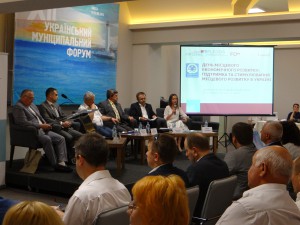 On June 21-23, 2016, in the city of Odesa, XII Ukrainian Municipal Forum took place. The purpose of the Forum was to create a platform for learning, exchange of experience and advanced practices in the sphere of local self-government and local economic development. The Forum was divided into three thematic days, namely Dialogue Between Government Bodies Day, Local Economic Development Day and Strategies Day. About 300 participants took part in the event, including city mayors, representatives of government bodies and local self-government, Federation of Canadian Municipalities (FCM), international technical assistance projects, international and Ukrainian experts, mass media representatives, etc.
On June 21-23, 2016, in the city of Odesa, XII Ukrainian Municipal Forum took place. The purpose of the Forum was to create a platform for learning, exchange of experience and advanced practices in the sphere of local self-government and local economic development. The Forum was divided into three thematic days, namely Dialogue Between Government Bodies Day, Local Economic Development Day and Strategies Day. About 300 participants took part in the event, including city mayors, representatives of government bodies and local self-government, Federation of Canadian Municipalities (FCM), international technical assistance projects, international and Ukrainian experts, mass media representatives, etc.
The first day of the Forum started with Dialogue Between Government Bodies Day. Kyiv Mayor and Head of the Association of Ukrainian Cities Vitali Klitschko made a welcome speech. In his speech, Mr. Klitschko stressed the importance of decentralization reform and the need for cooperation between the three branches of government for the sake of reforms. The participants were also greeted by First Deputy Head of the Administration of the President of Ukraine V. Kovalchuk, Vice-Prime-Minister of Ukraine G. Zubko, Executive Director of the Association of 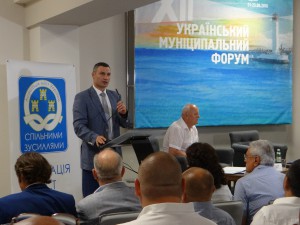 Ukrainian Cities (AUC) M. Pittsyk, Head of AUC Committee on Self-Government Reform G. Minayeva, Ukrainian MP M. Fedoruk, Odesa Mayor G. Trukhanov, and many others.
Ukrainian Cities (AUC) M. Pittsyk, Head of AUC Committee on Self-Government Reform G. Minayeva, Ukrainian MP M. Fedoruk, Odesa Mayor G. Trukhanov, and many others.
During the second day of the Forum, PLEDDG Project hosted Local Economic Development Day (LED Day), which saw an active discussion on local economic development in Ukraine. During that day, two plenary sessions and three section meetings took place, in the course of which participants discussed issues of state policy regarding the facilitation of regional and local development, SME development policy priorities at the local level, implementation of democratic government principles, and providing equal rights to men and women in the process of territorial development.
AUC Executive Director Myroslav Pittsyk announced the beginning of LED Day and wished the participants a functional and fruitful discussion. The participants were greeted by UAC Deputy Executive Director Valeriy Baranov and Ukrainian MP Iryna Suslova. 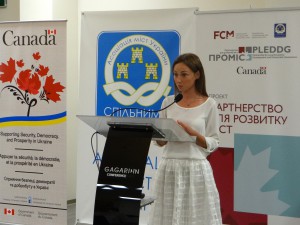 Ms. Suslova pointed out that by signing the Association Agreement with the EU, Ukraine had taken on obligations to protect human rights and freedoms, particularly regarding gender equality, and stressed the importance of including gender perspectives into social and economic territorial development programs.
Ms. Suslova pointed out that by signing the Association Agreement with the EU, Ukraine had taken on obligations to protect human rights and freedoms, particularly regarding gender equality, and stressed the importance of including gender perspectives into social and economic territorial development programs.
After the official opening of LED Day, the plenary session on support of territorial economic development in Ukraine began. First Deputy Minister of Regional Development, Construction, Housing and Utilities of Ukraine Viacheslav Negoda outlined the key elements of national policy on regional and local development. Mr. Negoda stressed the need for qualitative investments development projects, pointing out that there was lack of projects aimed at creating jobs and increasing investment attractiveness of territories.
National SME development policy priorities were highlighted by Volodymyr Semenikhin, Director of Regulatory Policy and Entrepreneurship Development Department at the Ministry of Economic Development and Trade of Ukraine. Mr. Semenikhin said that he was glad to have an opportunity to engage representatives of local self-government in the preparation of the SME Development Strategy and introduction of amendments to the national strategy. According to Mr. Semenikhin, the SME Development Strategy should be based on three pillars, such as the creation of favorable conditions for business running, including business deregulation, institutional development, and elaboration of business support programs.
Chris Coleman, a member of the Board of Directors of the Federation of Canadian Municipalities (FCM) and City Councillor of Victoria (British Columbia, Canada), greeted the participants on behalf of the FCM. Mr. Coleman is serving his fifth term as City Councillor. He has been involved with various committees to council including Economic Development, Finance and Human Resources, Alternate to Housing, and the Capital Regional District’s Environment, Solid Waste Advisory, Regional Growth Strategy committees and Alternate CRD Director.
Chris Coleman is also a member of a Standing Committee on Increasing Women’s Participation in Municipal Government. Mr. Coleman spoke about the role the FCM has in facilitating territorial development in Canada. In his speech, Mr. Coleman focused on the cooperation of FCM with the Association of Ukrainian Cities. He also expressed his hope that such cooperation would be beneficial both for Ukrainian communities and Canadian municipalities.
Following the end of the plenary session, three parallel sections took place – “Democratic governance as the cornerstone of effective community development”, “Small and medium enterprises (SME) as a driving force behind local economic development”, and “Gender equality issues in local economic development”. Moderators of the sections were PLEDDG senior experts Ihor Lepyoshkin, Oleh Voytovych, and Solomiya Rozhko respectively.
In the course of the first section devoted to democratic governance, presentations were delivered by V. Liakh, President of Eastern Europe Fund, K. Ploskyi, Deputy Director of the Polish-Ukrainian Cooperation Foundation PAUCI, O. Derkach, secretary of Poltava City Council, T. Zhuravel, Deputy Head of GIZ Project “Management Reform In Eastern Ukraine”, O. Kubar, from GIZ Project “Management Reform In Eastern Ukraine”, I. Lukeria, expert in local democracy of USAID Project “Citizens in Action”
Viktor Liakh spoke about the implementation of modern open government instruments – “Open City” and “Local Petitions”. He noted that the ultimate goal of creating the system of local petitions is assistance to local self-government bodies by providing them with the ready-made technical solution and a package of draft local regulatory legal acts for implementation of the Law of Ukraine on the electronic petition. Kostiantyn Ploskyi and Oksana Derkach spoke about increasing citizen engagement in local budgeting. Ms. Derkach said that Poltava City Council had succeeded in engaging the local population in local budgeting processes. She noted that the city accepted the proposal of PAUCI Foundation, and a working group was formed. The relevant promotional campaign was started, which included publication of news on a website, in newspapers and on TV, production of flyers, posters, creation of graphical vireos, banner-stands, production and installation of billboards. Open meetings were arranged for all proactive Poltava residents with the purpose of their participation in the implementation of the municipal program “Participatory Budget”. Representatives of GIZ Project Taras Zhuravel and Oleksii Kubar spoke about administrative services centers in general and the Administrative Service Center in Lysychansk city in particular.
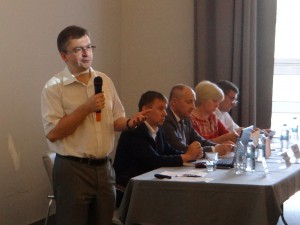 O.Kobzariev, Director City Mayor Administration Department of Lviv City Council, B. Mosunov, PLEDDG consultant, V. Smal, PLEDDG consultant, and Anatolii Kushnir, Zhmerynka Mayor, participated in the second section on SME development. Oleksandr Kobzariev told about instruments of SME support and shared success stories of certain business projects in Lviv. Bogdan Mosunov spoke about the role of local government in support of SME development, focusing on the methodology of performing the express-analysis of business climate and elaboration of the Program of SME development. According to Mr. Mosunov, problems that SMEs face include non-transparency and lack of information from government bodies, lack of skilled labor, unfair competition, limited availability of goods, products, and local production services on the consumer market, high taxes for real estate, land, etc. He summed up to ease business running is possible by means of disclosing information on purchase for budget funds, forming actual resource base of the communal property and monthly monitoring and updating of information, development of the program of staff training “to order” for small business, inventorying of “administrative services” and development of efficient local programs on allocation of funds on a repayable basis under new and operating business. In the end, Valentyna Smal, PLEDDG consultant, presented results of the topical investigation of the problems and prospects of social and economic adaptation of internally displaced persons (IDPs) in host communities of Vinnytsia, Poltava, Ivano-Frankivsk, and Zaporizhia oblasts, undertaken within PLEDDG Project in the first half of 2016.
O.Kobzariev, Director City Mayor Administration Department of Lviv City Council, B. Mosunov, PLEDDG consultant, V. Smal, PLEDDG consultant, and Anatolii Kushnir, Zhmerynka Mayor, participated in the second section on SME development. Oleksandr Kobzariev told about instruments of SME support and shared success stories of certain business projects in Lviv. Bogdan Mosunov spoke about the role of local government in support of SME development, focusing on the methodology of performing the express-analysis of business climate and elaboration of the Program of SME development. According to Mr. Mosunov, problems that SMEs face include non-transparency and lack of information from government bodies, lack of skilled labor, unfair competition, limited availability of goods, products, and local production services on the consumer market, high taxes for real estate, land, etc. He summed up to ease business running is possible by means of disclosing information on purchase for budget funds, forming actual resource base of the communal property and monthly monitoring and updating of information, development of the program of staff training “to order” for small business, inventorying of “administrative services” and development of efficient local programs on allocation of funds on a repayable basis under new and operating business. In the end, Valentyna Smal, PLEDDG consultant, presented results of the topical investigation of the problems and prospects of social and economic adaptation of internally displaced persons (IDPs) in host communities of Vinnytsia, Poltava, Ivano-Frankivsk, and Zaporizhia oblasts, undertaken within PLEDDG Project in the first half of 2016.
The third section on gender equality in LED took place under participation of Canadian gender equality expert Beth Woroniuk and Councillor Chris Coleman, Ukrainian MP Iryna Suslova, Pervomaisk City Mayor Liudmyla Dromashko, Chairman of the Board of Zaporizhia charitable fund “Unity for the future” Tamara Ogorodova, and gender equality consultant of PLEDDG Project Olena Tykhomyrova. Presentations were made by S. Garashchenko, expert of the Project “Gender budgeting in Ukraine”, N. Karpets, deputy of Komsomolsk City Council, and S. Sulimova, Gender Equality Counselor to Vinnytsia City Mayor. Iryna Suslova spoke about the role of Ukrainian Parliament in forming state policy on equal rights and opportunities for women and men. In their turn, Nelli Karpets and Svitlana Sulimova spoke about implementation of gender equality principles of local self-government bodies. Advantages of gender-oriented budgeting implementation in Ukraine were disclosed by expert Svitlana Garashchenko who presented the Project “Gender budgeting in Ukraine”, implemented under financial support of the Swedish International Development Cooperation Agency in partnership with the Ministry of Finances of Ukraine.
Once the parallel sections drew to an end, all the participants gathered once again for a second plenary session to sum up the results of LED Day in general and work in sections in particular. Representatives of every section were chosen, who spoke about the results of discussions in their respective sections.
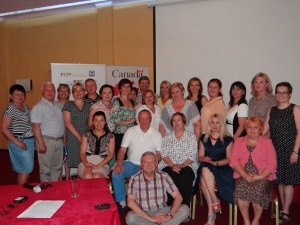 PLEDDG Project Director Oleksandr Kucherenko thanked the participants for their active participation in discussions and announced the closing of LED Day.
PLEDDG Project Director Oleksandr Kucherenko thanked the participants for their active participation in discussions and announced the closing of LED Day.
On June 23, the working session of the Section On Equal Rights and Opportunities for Women and Men of the Association of Ukrainian Cities took place. It was conducted under participation of representatives of local self-government bodies from different cities of Ukraine, experts and consultants of PLEDDG Project and FCM, and representatives of non-governmental organizations. Participants were greeted by UAC Deputy Executive Director Valeriy Baranov and Pervomaisk city mayor Liudmyla Dromashko. The event was moderated by Solomiya Rozhko, PLEDDG Project Support Manager. Participants discussed the opportunities and challenges regarding gender equality, exchanged experience, information and best practices on strengthening the role of women in society; did brainstorming in small groups to determine opportunities and priorities for the future work in the sphere of gender equality.

